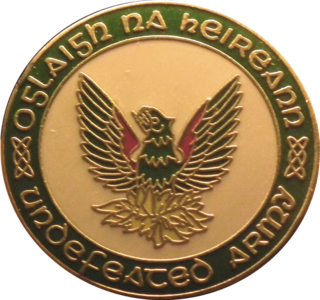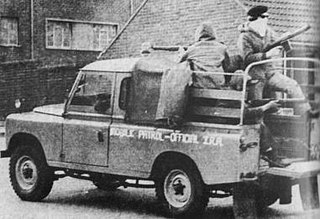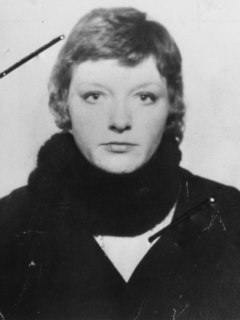Related Research Articles

The Irish Republican Army, also known as the Provisional Irish Republican Army, and informally as the Provos, was an Irish republican paramilitary organisation that sought to end British rule in Northern Ireland, facilitate Irish reunification and bring about an independent, socialist republic encompassing all of Ireland. It was the most active republican paramilitary group during the Troubles. It saw itself as the army of the all-island Irish Republic and as the sole legitimate successor to the original IRA from the Irish War of Independence. It was designated a terrorist organisation in the United Kingdom and an illegal organisation in the Republic of Ireland, both of whose authority it rejected.

The Troubles were an ethno-nationalist conflict in Northern Ireland that lasted about 30 years from the late 1960s to 1998. Also known internationally as the Northern Ireland conflict, it is sometimes described as an "irregular war" or "low-level war". The conflict began in the late 1960s and is usually deemed to have ended with the Good Friday Agreement of 1998. Although the Troubles mostly took place in Northern Ireland, at times violence spilled over into parts of the Republic of Ireland, England and mainland Europe.

The Official Irish Republican Army or Official IRA was an Irish republican paramilitary group whose goal was to remove Northern Ireland from the United Kingdom and create a "workers' republic" encompassing all of Ireland. It emerged in December 1969, shortly after the beginning of the Troubles, when the Irish Republican Army (IRA) split into two factions. The other was the Provisional IRA. Each continued to call itself simply "the IRA" and rejected the other's legitimacy. Unlike the "Provisionals", the "Officials" did not think that Ireland could be unified until the Protestant majority of Northern Ireland and Catholic minority of Northern Ireland were at peace with each other. The Officials were Marxist-Leninists and worked to form a united front with other Irish communist groups, named the Irish National Liberation Front (NLF). The Officials were called the NLF by the Provisionals, the "stickies" by nationalists in Belfast, and were sometimes nicknamed the "Red IRA" by others.

Stiff Little Fingers are a Northern Irish punk rock band from Belfast, Northern Ireland. They formed in 1977, at the height of the Troubles. They started out as a schoolboy band called Highway Star, doing rock covers, until they discovered punk. They were the first punk band in Belfast to release a record - the "Suspect Device" single came out on their own independent label, Rigid Digits. Their album Inflammable Material, released in partnership with Rough Trade, became the first independent LP to enter the UK top 20.

The Brighton hotel bombing was a Provisional Irish Republican Army (IRA) assassination attempt against the top tier of the British government that occurred on 12 October 1984 at the Grand Brighton Hotel in Brighton, England, United Kingdom. A long-delay time bomb was planted in the hotel by IRA member Patrick Magee with the purpose of killing Prime Minister Margaret Thatcher and her cabinet, who were staying at the hotel for the Conservative Party conference. Although Thatcher narrowly escaped the blast, five people connected with the Conservative Party were killed, including a sitting Conservative Member of Parliament, and 31 were injured.
The Northern Ireland peace process includes the events leading up to the 1994 Provisional Irish Republican Army (IRA) ceasefire, the end of most of the violence of the Troubles, the Good Friday Agreement of 1998, and subsequent political developments.

Martin Dillon is an Irish author, journalist, and broadcaster. He has won international acclaim for his investigative reporting and non-fiction works on The Troubles, including his bestselling trilogy, The Shankill Butchers, The Dirty War and God and the Gun, about the Northern Ireland conflict. The historian and scholar, Dr. Conor Cruise O'Brien, described him as "our Virgil to that Inferno". The Irish Times hailed him as "one of the most creative writers of our time".

The Remembrance Day bombing took place on 8 November 1987 in Enniskillen, County Fermanagh, Northern Ireland. A Provisional Irish Republican Army (IRA) bomb exploded near the town's war memorial (cenotaph) during a Remembrance Sunday ceremony, which was being held to commemorate British military war dead. Eleven people were killed, many of them elderly, and 63 were injured. The IRA said it had made a mistake and that its target had been the British soldiers parading to the memorial.

William James Nesbitt is a Northern Irish actor and television presenter.

British Army corporals Derek Wood and David Howes were killed by the Provisional IRA on 19 March 1988 in Belfast, Northern Ireland, in what became known as the corporals killings. The soldiers drove into the funeral procession of an IRA member. Three days before, loyalist Michael Stone had attacked an IRA funeral and killed three people. Believing the soldiers were loyalists intent on repeating Stone's attack, dozens of people surrounded and attacked their car. During this, Corporal Wood drew his service pistol and fired a shot into the air. The soldiers were then dragged from the car and taken to a nearby sports ground where they were beaten, stripped and searched. They were then driven to a nearby waste ground where they were shot dead.

Denis Martin Donaldson was a volunteer in the Provisional Irish Republican Army (IRA) and a member of Sinn Féin who was killed following his exposure in December 2005 as an informer in the employ of MI5 and the Special Branch of the Police Service of Northern Ireland. It was initially believed that the Provisional IRA were responsible for his killing although the Real IRA claimed responsibility for his murder almost three years later. His friendship with French writer and journalist Sorj Chalandon inspired two novels: My Traitor and Return to Killybegs.

Dolours Price was a Provisional Irish Republican Army (IRA) volunteer.

Owen Martin O'Hagan was an Irish investigative journalist from Lurgan, Northern Ireland. After leaving the Official Irish Republican Army and serving time in prison, he began a 20-year journalism career, during which he reported on paramilitary activity in Northern Ireland before being murdered in September 2001.
The Troubles were a period of conflict in Northern Ireland involving republican and loyalist paramilitaries, the British security forces, and civil rights groups. They are usually dated from the late 1960s through to the Good Friday Agreement of 1998. However, sporadic violence continued after this point. Those that continued violence past this point are referred to as "dissident republicans and loyalists". By 1998 the Troubles had claimed roughly 3500 lives.
William Reid was a member of the Belfast Brigade of the Provisional Irish Republican Army. Reid shot the first British Army soldier on duty killed in the Troubles and was later himself killed as he attempted another ambush of British Army personnel.
The Battle of St Matthew's or Battle of Short Strand was a gun battle that took place on the night of 27–28 June 1970 in Belfast, Northern Ireland. It was fought between the Provisional Irish Republican Army (IRA) and Ulster loyalists in the area around St Matthew's Roman Catholic church. This lies at the edge of the Short Strand, a Catholic enclave in a mainly-Protestant part of the city. Violence had erupted there, and in other parts of Belfast, following marches by the Orange Order. The battle lasted about five hours and ended at dawn when loyalists withdrew. The British Army and police were deployed nearby but did not intervene. Three people were killed and at least 26 wounded in the fighting, while another three were killed in north Belfast.

Cycle of Violence, also known as Crossmaheart, is the first stand-alone novel by Northern Irish author, Colin Bateman, released on 13 November 1995 through HarperCollins. The novel follows a journalist named Miller and his appointment in the hostile town of Crossmaheart; it was well received by reviewers. A movie adaptation has been made, named Crossmaheart also, and was featured in a number of film festivals.

"Alternative Ulster" is the second single by the Northern Irish punk band Stiff Little Fingers. Originally released as a single on October 17, 1978, the song later appeared on the band's 1979 debut studio album, Inflammable Material.
References
- ↑ Monaghan, Karl (14 May 2011). "Spiderman Versus The IRA". broadsheet.ie. Broadsheet . Retrieved 30 December 2016.
- ↑ Leonard, Allan (9 November 2011). "Graphic portrayals: Northern Ireland, graphic novels and the peace process". sluggerotoole.com. Slugger O'Toole. Retrieved 30 December 2016.
- ↑ Burgas, Greg (20 September 2014). "Year of the Artist, Day 263: Marc Silvestri, Part 2 - Web of Spider-Man #22". cbr.com. Comic Book Resources . Retrieved 30 December 2016.
- ↑ l Belfast: the war against cliché | | guardian.co.uk Arts
- ↑ http://hometown Archived 2013-07-17 at the Wayback Machine . aol. co.uk/KHA200/Irish_History_Song.pdf
- ↑ Seitz, Dan (17 November 2011). "5 Captain Planet Episodes That Went Horribly Wrong". uproxx.com. Uproxx . Retrieved 30 December 2016.
- ↑ Flaherty, Ciara (6 October 2015). "Have you seen that ludicrous Captain Planet episode set in Belfast?". irishexaminer.com. Irish Examiner . Retrieved 30 December 2016.
- ↑ Mulraney, Francis (18 October 2015). "Captain Planet "saves" Belfast and promotes peace in Northern Ireland". irishcentral.com. IrishCentral. Retrieved 30 December 2016.
- ↑ "Where are the IRA when you need them? - Bart Simpson". belfasttelegraph.com. Belfast Telegraph. 17 October 2008. Retrieved 30 December 2016.
- ↑ "Campbell not impressed with Simpsons humour". londonderrysentinel.com. Londonderry Sentinel. 13 October 2015. Retrieved 30 December 2016.
- ↑ Block H Official Website http://www.blockh.net/
- ↑ The Hooded Gunman Official Website http://www.hoodedgunman.com/
- ↑ The Guardian https://www.theguardian.com/uk/2007/may/16/northernireland.games
- ↑ Young, Connla (1 December 2021). "Educational board game on Troubles to be launched". The Irish News . Retrieved 30 December 2021.